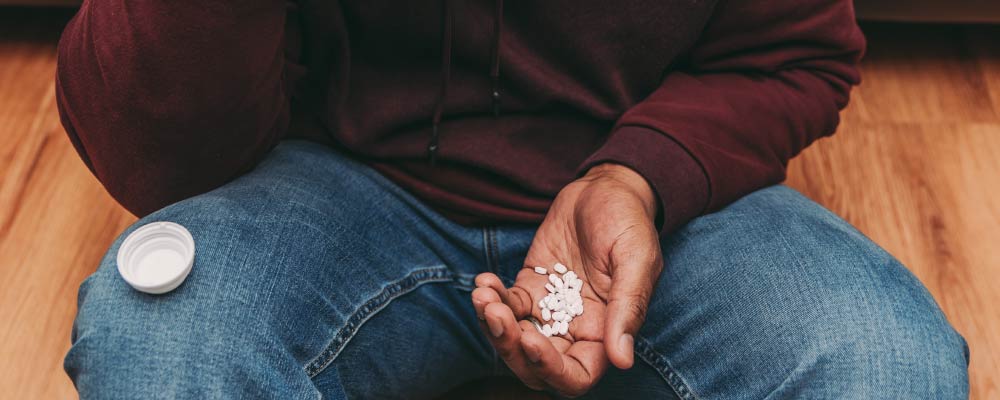If you have a problem with drugs or alcohol, you know how hard it is to quit. It can feel like you are in a war with yourself. And once you quit, you need to stay sober because most people who quit their addiction relapse within a year. Relapse prevention strategies are the key to staying sober and healthy. We are ADAPT Programs, and we are here to help you live a sober life without substance use disorder through our relapse prevention programs.
Understanding Relapse: Stages and Signs
Relapse is the return to drug or alcohol use after trying to stop. It’s a gradual process, not a single event. We will explore the stages of relapse, why they occur, and how to recognize them. Here’s what to look out for in each stage:
Stages of Relapse
EMOTIONAL RELAPSE- Feelings and behaviors may indirectly increase risk.
- Signs include anxiety, mood swings, isolation, neglecting self-care, and avoiding support systems.
MENTAL RELAPSE
- A battle between wanting to use and wanting to stay sober.
- Includes nostalgia for substance use, longing for past use environments and company, and coping struggles.
PHYSICAL RELAPSE
- Actual substance use begins, potentially spiraling back into habit.
- Urgent help needed from support networks or professional services like ADAPT Programs.
Signs of Relapse
You can stop relapse before it happens if you know what to look for. There are some warning signs that can tell you that you are at risk of relapse. These signs can be things that you do or feel or things that happen around you. Watch out for these warning signs that might show you are at risk of relapsing:
- CHANGES IN BEHAVIOR:If you notice you’re acting or feeling different from your usual self, it could be a sign.
- NEGLECTING SELF-CARE:When you stop looking after your own health and well-being, it’s time to be alert.
- WITHDRAWING SOCIALLY:If you’re pulling away from friends and family, it’s important to recognize this as a potential warning.
- RELATIONSHIP PROBLEMS:Trouble with people close to you can be an indicator that you’re struggling.
- MISSING APPOINTMENTS:Skipping out on therapy sessions or support groups is a red flag.
- REJECTING HELP:Turning down assistance or advice from others might mean you’re heading toward a relapse.
Building a Solid Relapse Prevention Plan
Creating a relapse prevention plan is a key step in recovery. It’s not just a safety net, but a way to understand your triggers and how to manage them. A well-thought-out plan acts as your roadmap to avoid relapse. Below, we lay out clear strategies to help you build an effective prevention plan.
- IDENTIFY TRIGGERS:Know what situations, emotions, or people might tempt you to use again.
- DEVELOP COPING STRATEGIES:Have a list of actions to take when you feel a trigger, like calling a friend or going for a walk.
- BUILD A SUPPORT NETWORK:Surround yourself with people who support your recovery efforts.
- ESTABLISH HEALTHY ROUTINES:Create a daily schedule that includes activities promoting well-being.
- PRACTICE STRESS MANAGEMENT:Learn and use stress-relief techniques such as deep breathing or meditation.
- SET PERSONAL GOALS:Have clear, achievable goals for your personal and professional life.
- STAY PHYSICALLY ACTIVE:Engage in regular physical exercise to boost mood and reduce stress.
- MAINTAIN A BALANCED DIET:Eating well helps manage cravings and maintain overall health.
- MONITOR THOUGHTS AND EMOTIONS:Keep a journal to reflect on your thoughts and feelings regularly.
- SEEK PROFESSIONAL HELP:Don’t hesitate to reach out to professionals like ADAPT Programs for guidance.
Coping with Triggers and Stressors
Triggers are personal factors that might tempt you to start using drugs or alcohol again. They can be people you used to use substances with, locations where you used, stressful situations, or specific emotions that create a desire to use.
To deal with these triggers, simple actions can be effective. Try deep breathing exercises, playing a sport, spending time outdoors, or engaging in a hobby. These activities are good for releasing built-up emotions and reducing the influence of your triggers.
Strategies for Maintaining Long-Term Sobriety
Staying sober is a big challenge that requires a long-term plan and hard work. You need to be committed and motivated to stay away from drugs or alcohol. But you don’t have to do it alone. There are many simple things you can do in your life that can help you a lot in your sobriety.
Exercise Regularly
Exercise can improve physical and mental health, reduce stress, boost mood, and increase self-esteem. It can also help you manage cravings and withdrawal symptoms and prevent relapse. You can choose any type of exercise, such as walking, running, swimming, cycling, or yoga. The important thing is to do it consistently and have fun.
Eating Healthy
Another thing you can do is eat healthy. Eating healthy can help you feel, look, and function better. It can also help you avoid or manage some of the health problems that can come from alcohol abuse, such as liver damage, diabetes, heart disease, and cancer. You can eat healthy by following some simple tips, such as eating more vegetables and fruits, drinking more water, avoiding processed foods, and limiting sugar and salt intake.
Change Your Lifestyle
Sometimes, being sober might mean changing your life a lot. This might mean saying goodbye to people who make you want to use drugs or alcohol or finding a new job. This can be hard, but it can also be rewarding. You can also explore new hobbies, passions, and goals that make you happy. There is nothing wrong with changing your life for the better. In fact, it is one of the best things you can do for yourself.
Utilizing Mindfulness and Meditation
Staying calm and aware with mindfulness and meditation can help you stay sober. These practices help you know and deal with your thoughts and feelings that make you want to use drugs or alcohol. By being mindful, you learn to notice thoughts without acting on them immediately. Some of these relaxation techniques can be as easy as doing things like breathing deeply, living in the moment instead of worrying about the past or future, or spending some time each day to meditate.
Mindfulness and meditation have many benefits for your health and well-being. They can help you reduce stress, depression, anxiety, and pain. They can also improve your memory, concentration, and mood. They can even lower your blood pressure and help you sleep better.
Support Systems and Community Resources
Having a strong network of support is crucial for sobriety. People who encourage and stand by you can ease your journey, provide hope, and assist you in facing challenges without turning to drugs or alcohol. This support might come from various individuals in your life:
- FAMILY AND FRIENDS:Those closest to you can offer daily encouragement and understanding.
- MENTORS:A respected guide can provide wisdom and advice based on their own life experiences.
- COUNSELORS: Professionals equipped with the skills to support your recovery journey.
Participating in sober community meetings is another powerful source of support, where you can gain insights and inspiration from the experiences of others in similar situations. At ADAPT Programs, we understand the power of a supportive community. We offer resources and guidance to strengthen your support system, which is an integral part of the recovery process.
FAQs: Navigating Relapse Prevention
What are some key relapse prevention techniques?Key techniques for preventing relapse involve a well-thought-out plan that identifies what triggers the urge to use substances. Techniques include managing stress, living healthily, undergoing relapse prevention therapy, and having strong support from friends, family, or support groups.
How can I create a strong support network to avoid relapse?
To build a robust support network, connect with sober individuals, find a mentor or counselor, and join support groups. Such communities offer understanding and support, which are vital for sustained recovery.
What role does mental health play in relapse prevention?
Mental health is vital in preventing relapse. Stress, anxiety, or depression can lead to substance use, so it’s important to keep mental health in check with therapies or mindfulness to avoid relapse.
How do ADAPT Programs assist in developing relapse prevention strategies?
ADAPT Programs offer expert guidance in crafting relapse prevention strategies, helping identify triggers, and providing tools to manage stress. They direct individuals to supportive resources and customize plans suited to each person’s needs.
What are five of the general relapse prevention principles?
Five core principles for relapse prevention include understanding addiction’s personal nature, emphasizing self-care, being aware of external triggers, valuing support networks, and ensuring the prevention plan is tailored to the individual.
Which of the following are suggested relapse prevention strategies?
Suggested strategies include creating a personal prevention plan, recognizing and handling triggers, applying stress management techniques, keeping a healthy lifestyle, and engaging with support networks for assistance.
What are the stages of a relapse prevention plan?
A relapse prevention plan’s stages start with understanding personal addiction patterns and triggers, devising strategies for dealing with potential relapse scenarios, enhancing self-control, achieving a balanced lifestyle, and regularly updating the plan as life evolves.
What are the main relapse prevention models?
Prominent relapse prevention models include the cognitive-behavioral approach focusing on coping skills, the stages of change model that acknowledges different recovery phases, and the self-determination model, which aims to boost personal motivation for long-term recovery.
Related Links
- Alcohol & Drug Addiction Treatment
- Stages of Addiction Recovery
- Heroin Detox Center in Houston
- Outpatient Detox Program in Houston
- Physical and Emotional Effects of Drug Addiction
- Opiate Detox in Houston
- Cocaine Rehab Center in Houston
- Family’s Role in Addiction Recovery
- Kratom Addiction Treatment
- Mental Health Program
- Drug Addiction Treatment Guide
- Benzo Detox in Houston
- Xanax Drug Rehab Houston
- Different Types Of Drug Addiction



